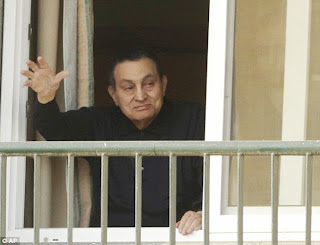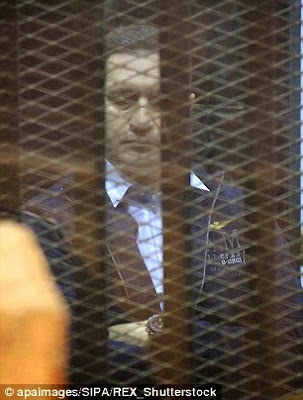An Egyptian court has sentenced former president Hosni Mubarak and his two sons to three years behind bars after a retrial of a corruption case dubbed the ‘presidential palaces’ affair by local media.
Mubarak and his sons are accused of using funds earmarked for the renovation and maintenance of the presidential residences to do up their own homes instead.
They are said to have taken £1.7million over the course of a decade – something they, and their supporters, deny strenuously.
Indeed, as the sentence was handed down on Saturday, those supporters watching the proceedings – some wearing t-shirts emblazoned with the 87-year-old autocrat’s face, and blOWING kisses as he entered the courtroom – shouted in anger.
‘We believe in you! We trust Mubarak!’ they yelled, as some women there began crying over the verdict.
Judge Hassan Hassanein said the ruling of the court was three years in prison without parole for Mubarak and his sons, Gamal and Alaa.
They were also ordered by pay back the money they took, along with a 125 million Egyptian pound fine (£10.5million).
Mubarak, wearing sunglasses, had no visible reaction to the verdict. His two sons, Gamal and Alaa, wore suits to the hearing and also had no reaction.
The length of the sentence broadly similar to the sentence handed down to the trio in May of last year – although his sons were given four years each on that occasion.
The Egyptian High Court overturned the decision in January, paving the way for this retrial.
A lawyer for Mubarak said the judge’s decision can be appealed, however it is unclear if they will serve any jail time as they have already spent that amount of time in prison in other cases.
Mubarak, who ruled Egypt with an iron fist for 30 years, was toppled during the Arab Spring uprisings which swept the region in 2011 and raised hopes of democracy.
Many Egyptians view Gamal, Mubarak’s one-time heir apparent, and his brother, wealthy businessman Alaa, as key pillars of an autocratic and corrupt administration that struck an alliance with the mega-wealthy at the expense of the poor.
Although father and son denied succession plans, that perception, along with corruption, police brutality and poverty, fueled the 2011 revolt.









